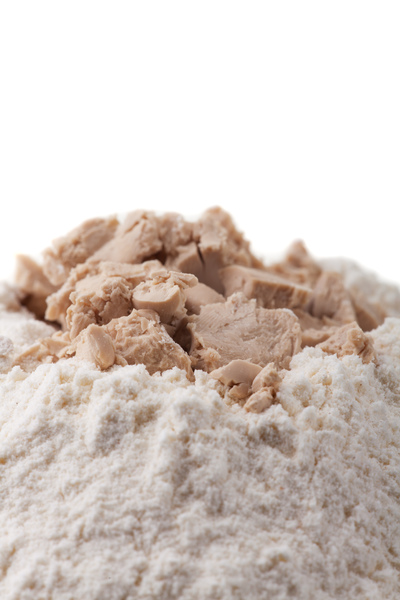Saccharomyces cerevisiae

Saccharomyces cerevisiae is a microorganism that belongs to the yeast family and is also known as brewer's yeast. It has been used for thousands of years in the production of bread, beer and wine, but also as a feed additive for various animal species, including dogs. In this article you will find out what Saccharomyces cerevisiae is, how it affects dogs and what its advantages and disadvantages are.
What is Saccharomyces cerevisiae?
Saccharomyces cerevisiae is a unicellular fungus that reproduces by budding. It lives mainly on plants, fruits and cereals, but can also be found in the intestines of humans and animals. Saccharomyces cerevisiae is able to ferment sugar into alcohol and carbon dioxide, making it responsible for the fermentation processes in the production of bread, beer and wine.
Saccharomyces cerevisiae is also considered a probiotic microorganism, which means that it has positive effects on the health of the host organism when administered in sufficient quantities. Probiotics can promote the balance of intestinal flora, improve digestion, strengthen the immune system and reduce the risk of infection and inflammation.
How does Saccharomyces cerevisiae affect dogs?
Saccharomyces cerevisiae can be used as a feed supplement for dogs to support various aspects of their health. The most important effects are
- Improve digestion: Saccharomyces cerevisiae can increase the activity of digestive enzymes, improve nutrient absorption and regulate intestinal motility. It can also prevent the colonization of harmful bacteria in the intestine and reduce the formation of toxins.
- Strengthening the immune system: Saccharomyces cerevisiae can stimulate the production of antibodies and immune cells, which are responsible for the defense against pathogens. It can also release anti-inflammatory substances and strengthen the intestinal mucosal barrier.
- Improving skin and coat health: Saccharomyces cerevisiae is rich in B vitamins, amino acids and minerals, which are important for the formation of skin cells, hair and claws. It can also stimulate the skin metabolism and promote the suppleness of the skin.
- Support of the nervous system: Saccharomyces cerevisiae contains nucleotides, which serve as building blocks for DNA and RNA. These are essential for the function of nerve cells and can help with stress or nerve damage.
What are the advantages and disadvantages of Saccharomyces cerevisiae?
Saccharomyces cerevisiae is a natural product that contains no artificial additives. It is considered safe and well tolerated by dogs when given in appropriate amounts. The recommended dosage depends on the dog's body weight and should be added to the food.
The advantages of Saccharomyces cerevisiae are:
- It is readily available and inexpensive.
- It has a broad effect on various aspects of dog health.
- It can be used both preventively and therapeutically.
- It has no known side effects or interactions with other medications.
The disadvantages of Saccharomyces cerevisiae are:
- It can cause bloating or diarrhea in some dogs if introduced too quickly or in too high a dose. This can be avoided by gradually increasing the amount.
- It may be contraindicated in dogs with a yeast allergy or fungal infection. In this case, a veterinarian should be consulted before it is administered.
- It may lose its effectiveness if stored for too long or exposed to high temperatures. It should therefore be stored in a cool, dry place and protected from direct light.
Saccharomyces cerevisiae is a probiotic microorganism that can have many positive effects on dogs' health when added to their food. It can support digestion, the immune system, skin and coat health and the nervous system. It is safe and well tolerated by dogs when given in appropriate amounts. However, it also has some disadvantages that should be considered, such as the possibility of flatulence, diarrhea, allergies or fungal infections. Therefore, it should always be used taking into account the individual needs and health status of the dog.
If you notice any signs of hypersensitivity or poisoning in your dog, you should see your vet immediately. We are not a substitute for a vet, but we try to be as accurate as possible. Every dog reacts differently and we recommend you get a second opinion or consult your vet if in doubt.
Stay healthy and take good care of your four-legged friend!😊